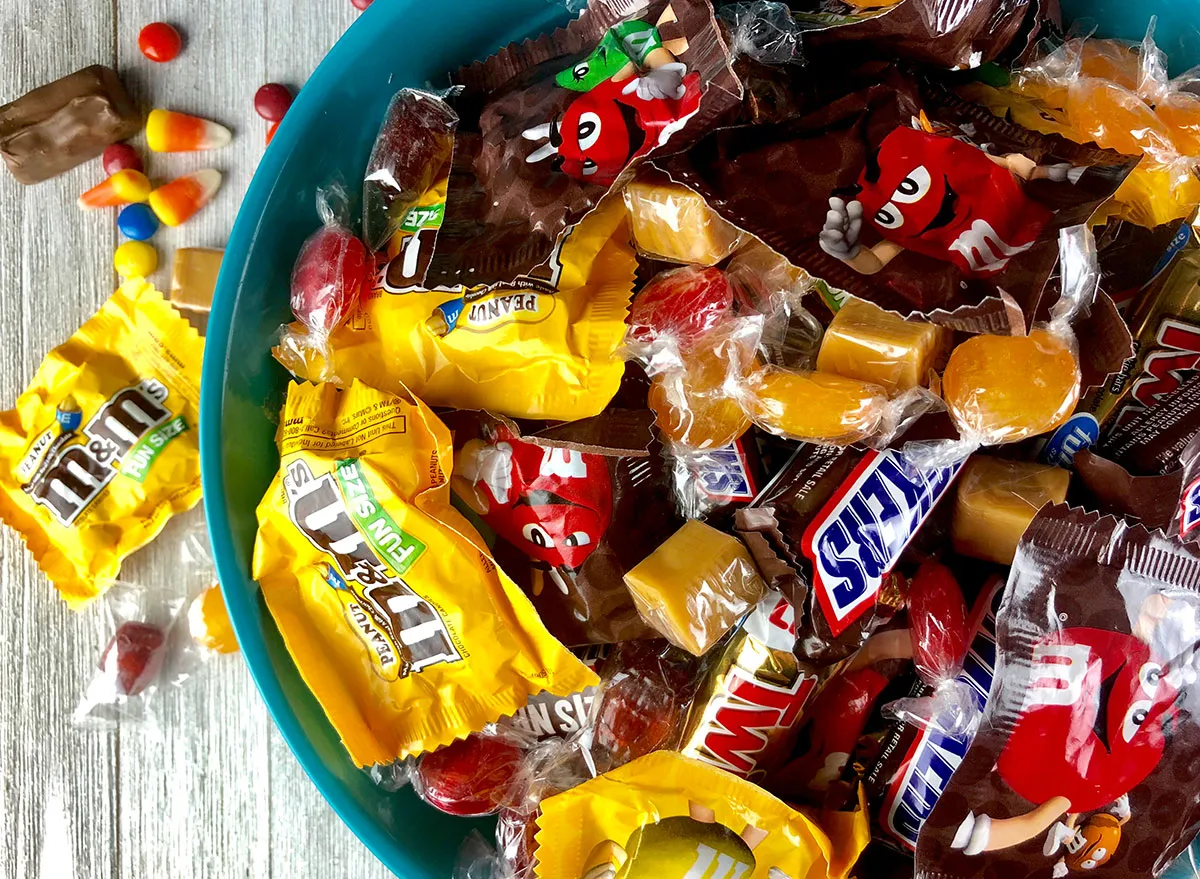Here’s What Happens to Your Body When You Eat Too Much Candy

When trick-or-treat time rolls around, it’s not just little ghouls and goblins who tend to overdo it on sweets. We grownups can also find ourselves consuming more sugar around Halloween than we normally would—and often more than what’s healthy or wise. With extra goodies circulating around the office and fun-sized (or even full-sized) candy bars beckoning temptingly from grocery store shelves, no one is immune to the sugar onslaught at the end of October.
While we’d never begrudge the occasional sweet indulgence—and we totally won’t judge if you sneak it from your kid’s trick-or-treat loot—going wild with Halloween candy can come with some unfortunate consequences. In both the short-term and the long-term, the body reacts to excess sugar with some pretty unpleasant effects. Here’s a look at exactly what eating too many Halloween treats does to your body, and how to keep your candy quota in check.
How much candy we’re eating
First, how much candy are most Americans actually eating this time of year? Though many of us might say sugar is a habit we ought to kick, the statistics around Halloween candy tell another story. Sales of these goodies have steadily risen in the last several years. Americans spend more on candy at the end of October than during any other holiday season. According to the National Retail Federation, we shelled out around $2.6 billion on candy for trick-or-treaters in 2018, equaling 300,000 tons. That’s a lot of Snickers and Sour Patch Kids.
Assuming all that candy is getting eaten, we’re probably taking in far more sugar than public health institutions recommend. The American Heart Association advises consuming no more than 25 grams of added sugar per day for women and 36 grams for men. The USDA gives a more generous allowance, suggesting a limit of 50 grams (or 12 teaspoons) of added sugar each day. But knocking back just 15 pieces of candy corn will net you 22 grams of added sugar. In the post-trick-or-treating rush, it’s entirely possible to take in hundreds of grams of added sugar in a single sitting.
The short-term effects of too much candy
When all is said and done and the living room floor is littered with wrappers, what’s happening in your body? Sugar takes a path through your esophagus and stomach to your small intestine, where it gets absorbed into the bloodstream in its simplest form: glucose. From there, glucose gets distributed to muscles and organs to provide them with energy. But sometimes, after a major influx of sugar, the body gets a bit overwhelmed.
“High-sugar foods with few other nutrients break down and are absorbed quickly, leading to an increase in blood sugar levels, then a decrease as insulin helps glucose enter cells,” says registered dietitian Jen Bruning, MS, RDN, LDN, spokesperson for the Academy of Nutrition and Dietetics. You probably know this dramatic spike-and-drop of blood sugar as a “sugar crash.”
For some people, especially those who have blood sugar-related conditions, this rise and fall can be a serious problem that requires medical intervention. For others, however, it’s a temporary state that simply makes us feel sick. “What some people may experience is not true low blood sugar; rather, a condition known as postprandial syndrome,” Bruning says. “Blood sugar levels are in the normal range, but a person is experiencing low blood sugar-like symptoms.” These signs and symptoms may include shakiness, irritability, nausea, lethargy, and lightheadedness. Although they may make you feel rather ill (and probably a bit regretful), they rarely require medical attention and typically resolve on their own.
In addition to wreaking havoc on your blood sugar, even a one-time candy binge is no friend to your dental health. “After each bite of sweets, the pH level within the mouth drops for 20 minutes, leaving the enamel of teeth more susceptible to erosion and the development of cavities,” says Dr. Heather Kunen, DDS, MS, of New York’s Beam Street dental and orthodontics clinic. When this happens, the destructive bacteria that feed on sugar in your mouth can get right to work on compromising your teeth. Kunen notes that between Halloween and Christmas, she sees a significant uptick in cavities in both adults and kids.
What too much candy can do in the long-term
While eating too much candy in one sitting can do a number on your blood sugar and your teeth, it’s true that occasional excess probably won’t do major lasting harm. In the long-term, however, repeated indulgence in high-sugar foods can increase your risk for a number of health problems. Diabetes, obesity, heart disease, depression, cancer, and even poor memory have all been linked to a diet high in sugar. Most experts believe this is because sugar causes inflammation in the body. Over time, and in combination with other factors like stress, poor sleep, or lack of exercise, inflammation can become chronic and disrupt the body’s healthy processes, leading to serious illness.
RELATED: The easy guide to cutting back on sugar is finally here.
Enjoying without overdoing
With the variety of health issues connected to excess sugar, it’s worth bringing some mindfulness to your candy consumption this time of year. To keep it moderate, start by looking at labels. As the FDA rolls out its new nutrition facts label in 2020, many food producers have already begun to comply with its upcoming “added sugars” listing. This little line item can tell you a lot about whether a particular treat is worth the indulgence.
You also may choose to get more selective about your sweets. “Separate your candy into piles of things you like the most, and everything else,” recommends Bruning. “Donate ‘everything else’ to a good cause, like sending treats to troops overseas, or to a local shelter. If you don’t really like these types of candy, you aren’t missing out on anything by giving it away.”
When you do decide to enjoy your favorite Halloween candy, be sure to savor it, giving it your full attention and enjoyment. Doing so has been shown to increase pleasurable sensations around food and prevent overeating. With these strategies, you’ll be on your way to enjoying the sweet season in moderation.








